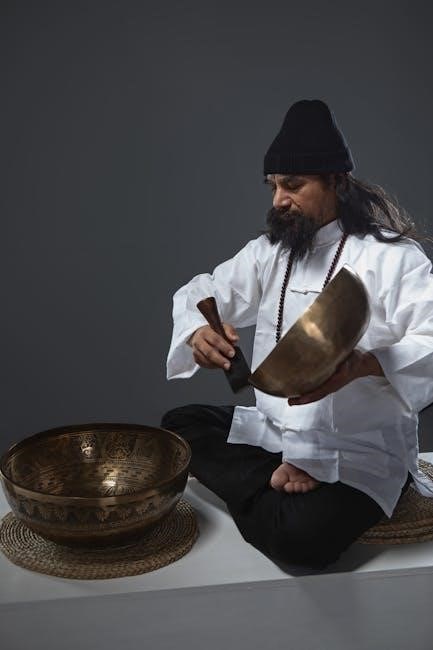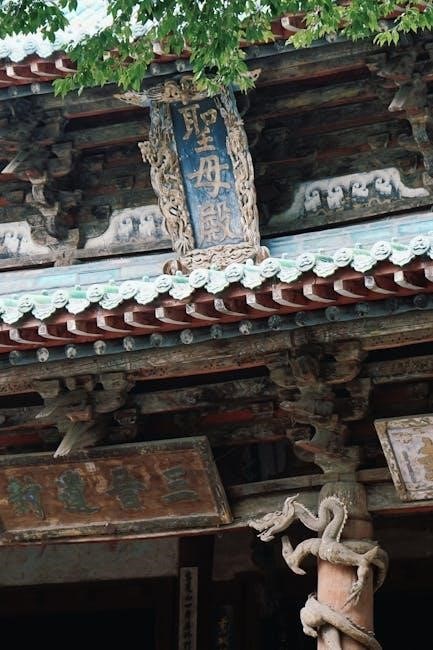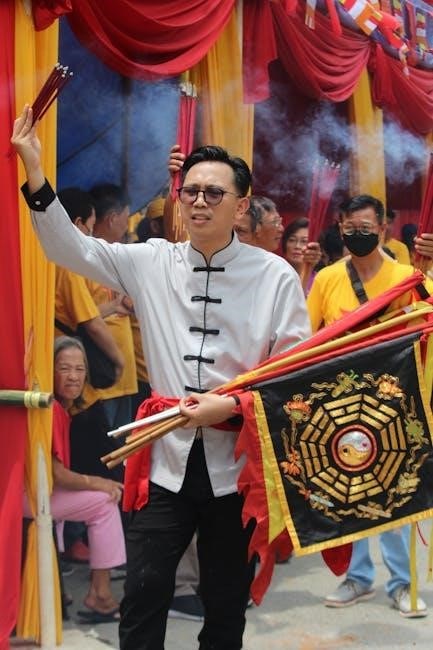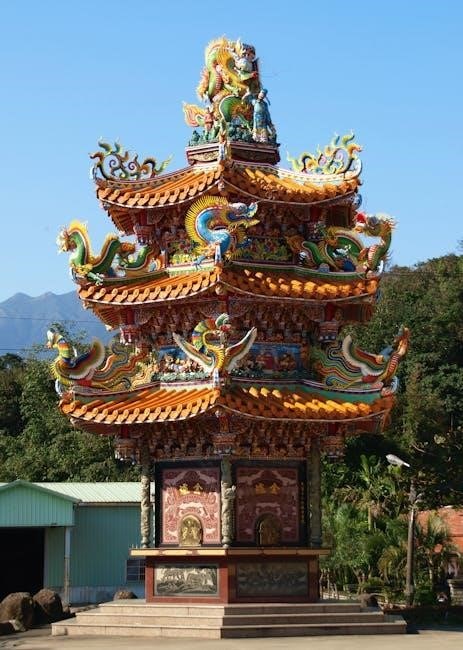Taoist Sexology is an ancient holistic practice integrating sexual techniques with spiritual growth, emphasizing harmony, balance, and vitality. It cultivates Chi energy and balances Yin and Yang, offering a profound approach to intimacy and well-being rooted in traditional Chinese wisdom.
1.1 Definition and Significance
Taoist Sexology is a holistic practice blending sexual techniques with spiritual and physical well-being. It emphasizes balancing Chi energy, harmonizing Yin and Yang, and cultivating vitality. Rooted in ancient Chinese philosophy, it views sexuality as a means to achieve longevity, spiritual growth, and inner harmony. By mastering sexual energy, practitioners aim to enhance their life force and attain a higher state of consciousness, making it a significant component of Taoist teachings for overall health and enlightenment.
Historical Background of Taoist Sexology
Taoist Sexology traces its roots to ancient China, evolving over centuries. It combines spiritual practices, medical wisdom, and philosophical insights, influenced by notable practitioners like Ge Hong and Sun Simiao.
2.1 Ancient Roots and Evolution
Taoist Sexology originated in ancient China, drawing from philosophical and medical traditions. Its evolution was shaped by texts like the Su Nu Ching and contributions from practitioners such as Ge Hong and Sun Simiao. These sources emphasized techniques to conserve ching (essence) and balance energies. Over time, practices were refined, blending spiritual and physical aspects to enhance vitality and longevity, reflecting a holistic approach to health and sexuality.

Core Principles of Taoist Sexology
Taoist Sexology revolves around balancing Yin and Yang, harmonizing Chi energy, and preserving Jing. These principles aim to enhance vitality, foster intimacy, and cultivate spiritual and physical well-being.
3.1 Yin and Yang Dynamics

In Taoist Sexology, Yin and Yang symbolize the harmonious interplay of opposites, essential for balancing energy. Yin represents receptivity and coolness, while Yang embodies activity and warmth. Their dynamic interaction fosters vitality and spiritual connection. Techniques aim to harmonize these forces, ensuring neither dominates, allowing for a unified flow of Chi. This balance is crucial for preserving Jing (sexual essence) and achieving longevity. By embracing Yin-Yang harmony, practitioners cultivate a deeper understanding of universal energy and its role in intimacy and well-being.
3.2 Chi Energy and Balance
In Taoist Sexology, Chi energy is the vital force governing all life processes. Its balanced flow is essential for health and spiritual growth. Sexual practices aim to cultivate and harmonize Chi, preventing its depletion. Techniques like controlled breathing and mindful intercourse help circulate Chi evenly, ensuring vitality. Imbalance can lead to stagnation or exhaustion, hindering well-being. By mastering Chi balance, practitioners achieve a harmonious state, fostering longevity and enhancing spiritual connection. This holistic approach emphasizes energy regulation as key to optimal health and intimacy.
3.3 Masculine and Feminine Energy Harmony
Taoist Sexology emphasizes the harmony of masculine (Yang) and feminine (Yin) energies. These opposing forces must unite to achieve balance and spiritual unity. Sexual practices focus on blending these energies, fostering mutual nourishment. Men absorb Yin essence, while women receive Yang energy, creating a symphony of vitality. This unity enhances intimacy, promotes health, and aligns with the natural order of the universe, ultimately leading to spiritual enlightenment and physical well-being through interconnected energy flow.
Practical Techniques in Taoist Sexology
Taoist Sexology offers practical methods to harmonize sexual energy with spiritual practices. Techniques include controlled breathing, physical postures, and mindful intimacy to enhance vitality and balance.
4.1 Methods for Sexual Energy Control
Taoist Sexology emphasizes techniques to regulate and harmonize sexual energy. Practices include controlled ejaculation, energy circulation through the body, and balancing masculine and feminine energies. These methods enhance vitality and spiritual connection, fostering longevity and inner balance. Techniques involve mindful breathing, physical postures, and conscious awareness during intimacy to channel energy effectively, ensuring mutual nourishment and spiritual growth for both partners.

4.2 Practices for Jing Preservation
Taoist practices for Jing preservation focus on conserving and enhancing life essence through controlled sexual energy. Techniques include limiting ejaculation, mindful breathing, and energy circulation. These methods prevent energy loss, fostering vitality and spiritual growth. By harmonizing masculine and feminine energies, practitioners aim to nourish the body and soul, promoting longevity and overall well-being. These practices are central to Taoist Sexology, emphasizing balance and sustainability in sexual and spiritual cultivation.

Spiritual Dimensions of Taoist Sexology
Taoist Sexology extends beyond physical practices, emphasizing the transformation of sexual energy into spiritual energy. It integrates meditation and inner alchemy to achieve higher consciousness and unity with the Tao.
5.1 Spiritual Purpose of Sexual Practices
Taoist sexual practices aim to transcend physical pleasure, fostering spiritual growth and unity with the Tao. Techniques like meditation and inner alchemy transform sexual energy into a divine force, cultivating immortality and enlightenment. By harmonizing Yin and Yang, practitioners seek to balance opposites, achieving a higher state of consciousness and oneness with the universe. This spiritual dimension elevates intimacy to a sacred ritual, promoting inner transformation and connection to the cosmic essence.
5.2 Role of Meditation and Inner Alchemy
Meditation and inner alchemy are central to Taoist Sexology, enabling practitioners to cultivate and transform sexual energy into spiritual energy. Through mindfulness and breathwork, individuals harmonize their Chi, balancing masculine and feminine energies. Inner alchemy involves refining and circulating this energy to nourish the body and soul, aiming for immortality and higher consciousness. These practices transcend physical desires, fostering spiritual unity and alignment with the Tao, ultimately achieving a profound state of inner peace and enlightenment.

Health Benefits of Taoist Sexology

Taoist Sexology offers numerous health benefits, including enhanced longevity, vitality, and emotional well-being. Practices improve energy balance, sexual health, and overall harmony, promoting a stress-free life.
6.1 Enhancing Longevity and Vitality
Taoist Sexology techniques aim to enhance longevity and vitality by conserving and balancing life energy, or Chi. Practices like controlling ejaculation and harmonizing Yin-Yang energies help preserve jing, the vital essence, promoting overall well-being. By transforming sexual energy into spiritual vitality, these methods support immune function, reduce stress, and foster emotional harmony, contributing to a healthier, more vibrant life and spiritual growth. Regular practice is believed to rejuvenate the body and extend lifespan naturally.

Comparison with Other Practices
Taoist Sexology shares similarities with Tantra in balancing energies for spiritual transcendence but differs in its focus on Chi cultivation and practical techniques without ritualistic deity worship.
7.1 Similarities and Differences with Tantra
While both Taoist Sexology and Tantra emphasize energy balance and spiritual growth, they differ in approach. Tantra often involves ritualistic practices and deity worship, whereas Taoist Sexology focuses on cultivating and balancing Chi energy through practical techniques. Both practices aim to harmonize masculine and feminine energies but vary in methods—Taoist techniques prioritize Jing preservation and longevity, while Tantra may incorporate expanded orgasms and ritualistic union for spiritual transcendence.
Cultural and Historical Context
Taoist Sexology has deep roots in ancient Chinese culture, blending spiritual and physical practices. It evolved over centuries, influenced by philosophers like Ge Hong and Sun Simiao, despite criticism from Confucian and Buddhist scholars, and experienced revitalization through external influences and integration of diverse practices.
8.1 Evolution and Reception Over Time
Taoist Sexology has evolved over centuries, blending spiritual and physical practices to harmonize human sexuality with cosmic principles. Despite criticism from Confucian and Buddhist scholars, it flourished, integrating external influences and revitalizing its practices. Its reception varied, with some viewing it as immoral, while others embraced its holistic benefits. Over time, it influenced both Chinese and Western cultures, adapting to modern contexts while preserving its ancient wisdom, making it a unique blend of tradition and contemporary application.

Modern Applications and Adaptations
Taoist Sexology techniques are now integrated into contemporary wellness practices, offering workshops, digital resources, and holistic approaches to enhance intimacy and vitality, blending ancient wisdom with modern lifestyles.
9.1 Integrating Techniques into Contemporary Life

Modern adaptations of Taoist Sexology blend ancient practices with contemporary lifestyles, offering workshops, online courses, and holistic retreats. These programs focus on enhancing intimacy, improving emotional connection, and promoting overall well-being by teaching techniques like energy control, breathwork, and mindful intercourse. By merging traditional methods with modern needs, Taoist Sexology provides accessible tools for individuals seeking to enrich their relationships and achieve physical and spiritual harmony in today’s fast-paced world.
Taoist Sexology bridges ancient wisdom with modern life, offering timeless techniques to enhance intimacy and well-being. Its holistic approach continues to inspire, promising a vibrant future in fostering deeper connections and spiritual growth.
10.1 Addressing Criticisms and Controversies
Taoist Sexology has faced criticism for its male-centered focus and ethical concerns. Some Confucian and Buddhist practitioners, along with Western critics, question its efficacy and moral grounding. Despite this, modern adaptations aim to balance gender dynamics, emphasizing mutual harmony and spiritual growth. By addressing these critiques, Taoist Sexology evolves to align with contemporary values while preserving its ancient wisdom.
10.2 The Significance and Future of Taoist Sexology
Taoist Sexology holds profound significance as a holistic practice blending spirituality, energy cultivation, and intimacy. Its future lies in modern adaptations, integrating timeless techniques into contemporary lifestyles to enhance well-being and connection. By fostering balance and harmony, it offers a unique pathway to spiritual and physical fulfillment, appealing to those seeking deeper meaning in their relationships and lives.
As global interest in holistic wellness grows, Taoist Sexology’s emphasis on energy balance and mindful intimacy continues to resonate, ensuring its relevance and evolution in the modern world.
